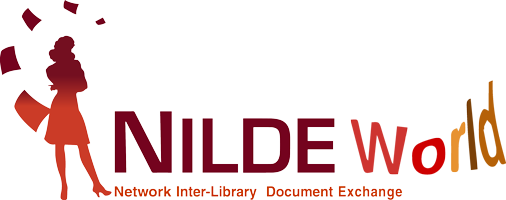You are here
Aims and activities of NILDE Internationalization Working Group (2017-2019)
Having in mind that some activities carried out by the different working groups crosscut similar areas (eg the promotion of NILDE covers both COMMUNICATION group that INTERNATIONALIZATION group), the aims and the scopes of the Internationalization Working Group programme in the next three years should take into account the recent technological developments and challenges.
An internationalization strategy must focus on the five trends that will play a critical role in the future of information according to the IFLA Trend Report 2016 Update:
·TREND 1 Access to Information (limitations and potential benefits associated to the use of new technologies and digital skills, eg.impact of automatic translation when accessing information)
·TREND 2 Online Education (new learning opportunities)
·TREND 3 Redefinition of Privacy and Data Protection (profiling, monitoring preferences and choices in e-lending services)
·TREND 4 Society and Hyper-connected groups (impact of communication on participation)
·TREND 5 New Technologies (Global information environment)
AIMS
Increasing the participation of libraries in NILDE, promoting NILDE and its philosophy abroad, studying document delivery practices of similar networks, joining European and international initiatives/activities for copyright reform, open access, open science, resources sharing. Improving library exchange and international cooperation.
ACTIVITIES
MAPPING LIBRARIES INTERNATIONAL EXCHANGES:
collecting a survey focusing not only on the type of fulfilled international requests (articles or parts of a book, source of the requests etc.), as done in the past, but also on “qualitative” aspects such as the characteristics of the libraries/institutions (scientific or humanities academic libraries, private institutions and foundations) involved in the exchange process and whether such exchanges are made on a reciprocity basis (for example, if they accept IFLA vouchers).
Ideally, this should lead to the development of a “global” ILL database containing useful information regarding international inter-library exchanges, similarly to the Spanish Directorio de Centros de Préstamo Interbibliotecario
COORDINATION with or CONNECTION to groups/initiatives for internationalization:
monitoring activities of other working groups/associations and making connections at both national (for instance with the Internationalization group of AIB (Associazione Italiana Biblioteche= Italian Libraries Association) and international level (for instance with Rethinking Resource Sharing Initiative).
PARTICIPATION to the reformulation of IFLA Guidelines for Best Practice in Interlibrary Loan and Document Delivery:
See IFLA DDRS (Document Delivery and Resource Sharing) working group http://www.ifla.org/publications/guidelines-for-best-practice-in-interlibrary-loan-and-document-delivery
In the official page there are translations in many languages (and even in Czech) but not in Italian.
SUPPORTING international initiatives and statements:
Supporting relevant projects for institutional purposes, such as LIBER statement, can give NILDE more visibility and makes international connections free of costs.
SPONSOR SEARCH:
Looking for any patronage to finance NILDE internationalization activities (Maybe Bill and Melinda Gates foundation? Why not?)
Dreams have no limits ... as Proust wrote, "If a little dreaming is dangerous, the cure for it is not to dream less, but to dream more, to dream all the time."
Internationalization also means promotion and dissemination of our data, overcoming the limitation of software and licenses.
Therefore, we need to work for interoperability and effective exchange of resources (see OCLC-CIPE project) and to face with evolved document supply systems.
RECIPIENTS:
ILL libraries and librarians, library consortia, Document Supply centers, Head of ILL/ Document Delivery Services.
FUTURE DEVELOPMENTS: can Italian NILDE become European or International network?
We believe that the way forward is the reform of European copyright law with appropriate exceptions for document delivery in the area of education and research.
